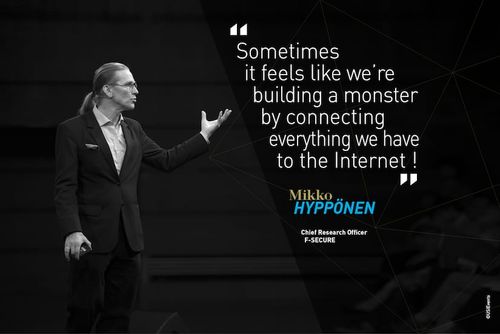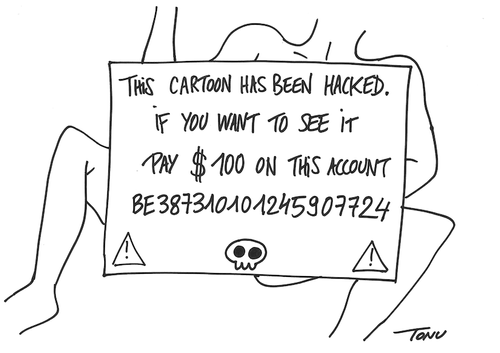Securing our futur: the new face of cybercrime
"The changes... It seems to be science fiction but it's actually happening"
Nicknamed the "sheriff of the Internet", Mikko Hyppönen has spent his life battling malware and protecting privacy. Cybercrime has been his area of predilection since 1991. His entire career has been built around the change of paradigm wrought by the Internet.
"We do everything online, instantaneously, and live in absolutely fascinating times". The history of the Internet started at the same time as his, in 1969, the year of his birth, and of that of "Woodstock, and the first man to walk on the moon". Coincidence? One thing is certain, and that is that he has dedicated his life to protecting our privacy.
Our data under high surveillance
Internet has changed the face of the Earth. When it was created, "for the first time, we had a free and open net" in an apparently free universe. But this freedom came at a cost: our security. Today we face two major problems on which our future depends: "security and privacy". Our security is threatened by all sorts of cybercriminels and hackers, as well as more official stakeholders - GAFA, corporations, governments, military organizations, etc. - who spy on our data. Whence the importance of opening our eyes to a threat for our entire society.
"Without computers our businesses would be completely paralyzed".
But this is no reason not to take protective measures.
On the importance of cybersecurity...
More than twenty years ago the first computer virus (Brain A, 1986) infected the Internet. What was at the time a simple alert has turned into a powerful weapon in cybercrime and generalized surveillance.
It now takes only one step to get from your connected light bulbs in the living room to hacking into your computer network. The Internet of Things (IoT) allows massive data mining, and makes us increasingly more vulnerable. What may now seem innocuous - an object, an email, a wristwatch... - can in fact infect your computer, network and even... country. Many criminal attacks have already been carried out, and appear ever better orchestrated. The world of cybercrime is becoming both more complex and more professional.
That being said, according to Mikko Hyppönen, what should worry us most is surely the involvement of our governments in the system: "governments create their own malware" to infect target systems and practice what is simply called "governmental industrial espionage at a global scale".
…And protecting our privacy
When speaking about cybersecurity, the problem is not only systems crashing and becoming vulnerable. It is also a threat to our privacy. All Internet users everywhere in the world are susceptible of being spied on and their data analyzed. Governments invade our privacy for intelligence purposes, and businesses to better profile us.
Google, Facebook, Twitter and other major IT successes are beautiful products but hide a much darker reality. You have to examine their services in more detail to grasp how they work. "buying an ad on Google will open your eyes". Indeed, there is no way to pay for such Google services. "The only way they get paid is through our personal data and our privacy. According to my estimate, each person contributes up to $33 to Google's revenue", i.e. a profit of $66 billion for 2 billion users. The data we unwittingly provide them allows them to obtain better prices from advertisers, and to implement one of the most powerful marketing machines in the world. The more data they have, the better they can target their audience, and the more they sell. That is how Google became the largest producer of servers and data centers. As for Whatsapp, acquired by Facebook for $22 billion, "through your mobile phone number, they link your real world profile to your online profile".
Time to react
We lead full lives on the web and many use the internet without limitations. Action must be taken urgently.
"Those who control our data know us better than our spouses do. We are more honest with search engines than with them".
It is now up to us to decide what we are going to do to pass down a neutral and free Internet to the next generation.
Read:
- Catching interconnected robots on the wing, Raffaello d'Andrea
- Data in the service of innovation, by Hilary Mason

